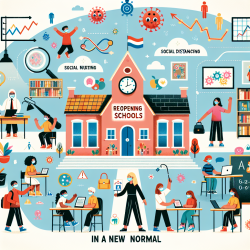As practitioners dedicated to improving the lives of children with Autism Spectrum Disorders (ASD), we continually seek evidence-based interventions that foster development. The study "Influence of a Specific Aquatic Program on Social and Gross Motor Skills in Adolescents with Autism Spectrum Disorders: Three Case Reports" provides compelling data on the benefits of aquatic therapy.
The study explored the effects of a 12-week multi-systemic aquatic therapy (CI-MAT) on three adolescents with ASD. The results demonstrated significant improvements in both gross motor skills and social behaviors. Here's how you can implement these findings in your practice:
Key Findings
- Gross Motor Skills: Participants showed marked improvements in locomotion (e.g., running, hopping) and object control skills (e.g., catching, throwing).
- Social Behaviors: Notable gains were observed in eye contact, sensitivity to others' presence, and turn-taking during interactions.
Implementation Strategies
To replicate these outcomes, consider incorporating the following strategies into your therapeutic practice:
- Structured Aquatic Activities: Develop a program that includes stages of emotional adaptation, swimming adaptation, and social integration. Tailor activities to the child's specific needs and abilities.
- Therapist-Client Interaction: Use the water as a medium to foster a secure attachment between the therapist and the child. Encourage clinging behaviors and playful interactions to build trust.
- Skill Development: Focus on enhancing both locomotion and object control skills through repetitive, engaging activities that challenge the child's motor abilities.
- Social Integration: Gradually introduce social elements by incorporating group activities and games that promote peer interaction and cooperation.
Encouraging Further Research
While the results are promising, it's crucial to expand the research to include larger sample sizes and control groups. Practitioners are encouraged to document and share their findings to contribute to the growing body of evidence supporting aquatic therapy for ASD.
To read the original research paper, please follow this link: Influence of a Specific Aquatic Program on Social and Gross Motor Skills in Adolescents with Autism Spectrum Disorders: Three Case Reports.










